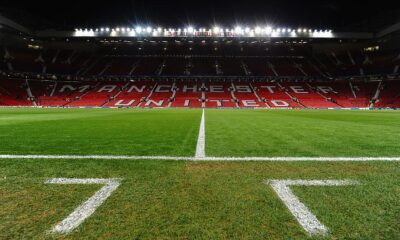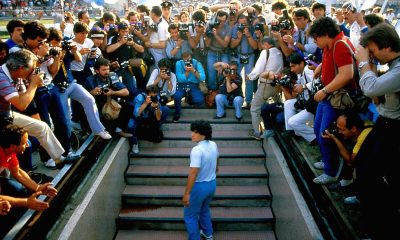Football
How Far Away is a Premier League Streaming Service?

How Far Away is a Premier League streaming service?
Allow yourself to close your eyes and imagine for a moment. Live and complete Premier League coverage. Games past and present. Interviews, documentaries and analysis. Everything we see now on multiple different networks collected onto a single streaming service. A single app, a single website and more importantly for the supporter: a single payment.
A few years ago this seemed generations away but now, people are increasingly getting use to watching Premier League football on their tablets and laptops. Amazon Prime became the first streaming company to show live Premier League football in the UK in December 2019 and the current television rights deal is up for renewal in 2022.
Everything appears to point to a move away from traditional broadcasters in the near future. While the idea for a DTC (Direct to Customer) plan may be simple, the economics and logistics are anything but. So, how far away is a Premier League streaming service? What would it look like? And how likely is it to actually happen? To get the full picture, does anyone remember the European Super League?
A long time coming
The European Super League and Project Big Picture
While the main objections to the now infamous European Super League was aimed at the destruction of the football pyramid and the demolition of the basic principles of sporting merit. A second glance at the proposals includes an interesting bullet point. One of the many perks given to each of the founding 12 clubs was the ability to broadcast a certain number of their own matches. Essentially, cutting out the middleman of the broadcaster and allowing the clubs to benefit even more financially. Kaveh Solhekol confirming on Sky Sports that “they [the six clubs] will be able to sell some of the rights to the games themselves on their own channels, the broadcast rights all over the world.”.
The attempt to shift broadcasting power from the TV companies and Premier League to the individual clubs should come as no surprise. It wasn’t too long ago that ‘Project Big Picture’ was the talk of the footballing world. The proposal, now considered a prelude to the Super League break away, proposed a shake up to Premier League voting rights and club power. Once again though, the full list of potential changes includes a nod to television rights. The Telegraph in October reported that one of the changes included that
“All Premier League clubs have the exclusive rights to sell eight live matches a season directly to fans via their own digital platforms in all international territories.”
The state of play
These two, not so subtle, attempts to wrestle broadcasting power away from TV companies have been inevitable. Since launching in 1992 on the back of BSkyB, The Premier League broadcasting rights have increased in value by an incredible margin. According to Tifo Football, the broadcasting rights have gone from being worth £50.7 million for the first 5 seasons (1992-1997) to £3.1 Billion per year during the current cycle (2019-2022). That means that each Premier League club makes a minimum of £135 million each year on top of bonuses. So, there is the current state of play. But with any business idea, is there the right level of demand?
Is there a demand?
The rising cost of being a supporter
Put simply, yes. There are a few reasons why supporters would welcome some form of change in how they consume football at home. The first of them is cost. Florentino Perez’s recent suggestion that matches should be shorter in length to combat a lack of interest in football by younger fans may have seemed ridiculous on the surface. But perhaps his call for change was correct. he just completed ignored that the cost of football is the problem.
When Amazon Prime joined the party in December 2019, they became the third name on a football fans monthly bill. Until that point, Sky and BT held exclusive rights to show Premier League games in the UK. Tifo Football estimates that supporters currently pay at least £76 a month for all three subscriptions; that’s over £900 a year. Meanwhile, Champions League and Europa League games became exclusive to BT Sport from 2015 after a £897 million deal was struck in 2013. Until then, ITV had held rights to broadcast the competitions, free for supporters, since the competition was rebranded in 1992. BT then retained the rights in a £400 million per year deal that runs until 2024.
All of this means it’s now much more expensive to watch football in the UK than ever before. On top of that, supporters have now been unable to go to live games for an entire year due to the pandemic. The growing fees for supporters aren’t exclusive to those watching at homes. Even before the pandemic, the average season ticket holder paid at least £32.50 per game in the Premier League. That’s before travel, food, tickets for friends and a trip to the club shop. The business is leaving its supporters behind.
A disconnect between us and them
There’s no doubt that a Premier League streaming service would be welcomed by supporters if planned correctly. The economic problems aside, fans do appear to be feeling the disconnect from the current broadcasters. Club channels are morphing into club propaganda for the clubs owners. Owners who recently displayed again their lack of understanding for the clubs supporters.
In addition, supporters now seem to be turning increasingly to fan run YouTube channels. The rise in popularity of the likes of AFTV, Stretford Paddock (formerly Full Time Devils) and The Kick Off, point towards the discontent for the more traditional broadcasters. In 2019, the BBC explored the rise of Fan Channels as recently as 2019. The overriding opinion seemed to be that the fans no longer felt that they had a voice. whether that be with how their club was run or how their clubs were discussed on television.
While a DTC streaming service would still come from individual clubs or the Premier League itself, it would provide more opportunity for personalisation. It would also simplify payments, decrease cost and increase popularity with those new to football. In the same way that Disney have shifted their attention from releasing films in cinema’s to more DTC projects like TV programs and films released on Disney+. All in all, there is certainly a demand for an alternative to the current system and an increasingly large apatite for a cheaper, more direct option.
Looks like BTSport is selling up and moving out of football. "Couldn't make it pay" Of course they couldn't when paying £9million per game, no-one can.https://t.co/LAbnuqZQZC
— John Nicholson (@JohnnyTheNic) April 29, 2021
Could this become reality?
Is it financially viable?
It’s one thing to dream, it’s another to do. When asking how far away is a Premier League streaming service, money is always the most important factor. As recent events have suggested, those in charge of clubs will do whatever makes them more cash. So is it viable? Well, yes but possibly not straight away and only if it’s done correctly.
DTC streaming is a high risk business financially. Under the current broadcasting system, clubs current have guaranteed income while a switch to a more pay per view system will not be so guaranteed. In addition, when looking to the current entertainment powerhouse Netflix, it is only this year that the company has not need to borrow money. Having borrowed approximately $16 billion in less than a decade previously. In fairness, the majority of this money was used to build it’s content library after starting relatively from scratch.
Perhaps a more suitable comparison would be to Disney+. Like the Premier League, Disney already had a large amount of content when launched Disney+ last year. Although recent reports suggest that they too expect to lose money until at least 2024.
Is it technically possible?
There are two clear differences between the two entertainment giants and the Premier League. Firstly, the consistent run of Premier League matches are comparatively cheap to stream, as opposed to the cost of creating a TV series or film. Secondly, there are already example’s around the world and in the UK of how live streaming could work. The Premier League do have there own Premier League Productions company that is used in some parts of the world for “off the shelf” content. The FA player is currently used to stream WSL matches for free and there has been relative success in the Football league with ifollow.
Following the pandemic and due to the lack of supporters in the ground, the EFL’s ifollow is possibly the closest thing to a prototype currently used in the UK. Season ticket holders are able to log into their clubs website and watch every club game for free at the moment. Meanwhile, non season ticket holders pay £10 per match for the privilege. The set up is admittedly fairly basic. Championship games contain local commentary and four separate cameras, while other EFL matches have consisted of just the one camera. This shouldn’t impact any plans for the Premier League though. As the financial gap between the top division and the rest has grown ever wider, as has the demand worldwide. ITV Digital famously learning the hard way that demand for Championship games doesn’t match the Premier league.
⚽ KEY STATS ⚽
?️ 1/5/21
? Walsall
?️ Banks's Stadium
? 3pm Kick-Off
??️ iFollow#COYS | #CWMFC pic.twitter.com/ClQqwqsz1s— The Carwash Terrace (@CWTerrace) April 30, 2021
Potential stumbling blocks
As previously mentioned, the current arrangement between broadcasters and the Premier League provides guaranteed funds year in, year out for the clubs regardless of where they finish in the league. A change to a DTC model of broadcasting would be possible but a huge task. The world wide appeal of Premier League football is both a gift and a curse. A gift, as it almost certainly guarantees a paying audience are ready and waiting for it across the world. But a curse in that each country and culture have different expectations. Each country will need games in their own language, with their own pundits, commentators and style. It would be a huge ask for the Premier League, whose primary concern is with running a football league, to become a global entertainment distributor.
The economic impacts of the global pandemic means that guaranteed money is incredibly valuable. Would now be the best time to change your entire business model? Not according to the BBC, who reported last month that the Premier League have held talks to scrap the upcoming TV rights auction. According to their sources, talks have been started on rolling over the current £4.7 billion deal. While other potential bidders would object to the arrangement, it is understood that:
So what next?
There is also little doubt that the short lived pay per view option that Sky Sports trialed earlier on in the season hasn’t encouraged anyone. It is understood that the £15 price was decided by Sky and that the Premier League wanted the price to be lower. nobody can be entirely surprised that Sky would not fully support an idea that could make them unnecessary in the long term.
For now, the pandemic and the fallout from the European Super League break away may force football to press pause on trying anything new. There is little doubt that in the long term, a DTC streaming system would be desirable for both clubs and supporters. For the Premier League, questions still remain over how exactly they could create a global streaming service. One that would provide supporters with the quality coverage that they’ve become used to. Whether or not they would be ready to invest money into a business model that may not make profits for a few years. And of course, whether or not they would be comfortable giving clubs more power after their recent power grab attempts.
The move appears inevitable but the timing will need to be perfect. In order to properly shift football into a new era for fans and clubs alike, things will take time.
We hope you enjoyed this article ‘How Far Away is a Premier League Streaming Service?’. Would you pay for a Premier League Streaming Service? Let us know!
Read more on football here:
-

 News3 weeks ago
News3 weeks agoThe Best Male Tennis Players of All Time
-

 Football3 weeks ago
Football3 weeks agoPlayers with the most goals in a Premier League season
-

 Football3 weeks ago
Football3 weeks ago10 of the most underrated footballers in the world right now
-

 News3 weeks ago
News3 weeks agoThe Fastest Rugby Players Ever
-

 Football3 weeks ago
Football3 weeks agoChelsea’s Possible Lineup For Next Season
-

 Football3 weeks ago
Football3 weeks agoWho is the Fastest Football Player in the World?
-

 Football3 weeks ago
Football3 weeks agoThe Best Penalty Takers of All Time
-

 Basketball4 weeks ago
Basketball4 weeks agoThe 5 Biggest NBA trades so far this off-season
















